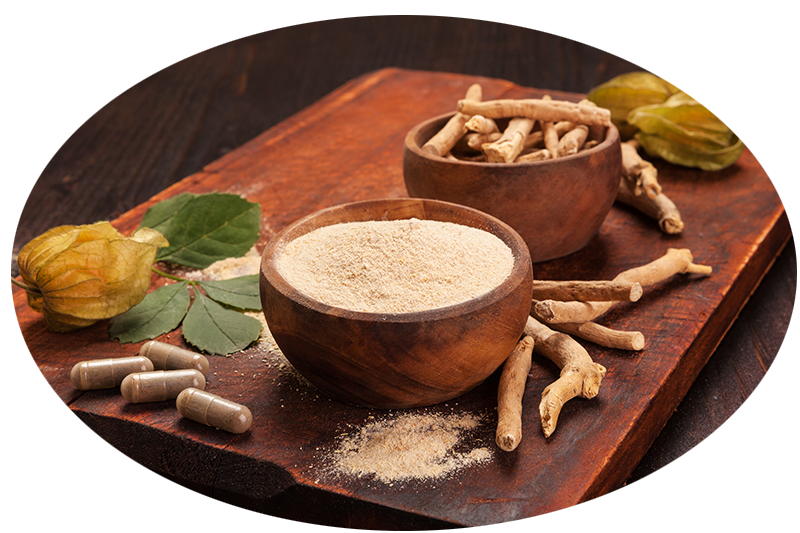Ashwagandha Benefits
The myriad benefits of ashwagandha span both physical and mental health realms. Its active compounds, including withanolides, are pivotal in imparting its therapeutic properties. Primarily, ashwagandha is lauded for its stress-reducing effects, as it lowers cortisol levels, the body’s stress hormone. This, in turn, aids in reducing anxiety and improving mood.
In the realm of physical health, ashwagandha contributes to enhanced strength and stamina. It supports muscle growth and recovery, making it a popular supplement among athletes. Moreover, it has shown promise in improving cognitive function, including memory and task performance, potentially due to its antioxidant activity that protects nerve cells from harmful free radicals.
Additionally, ashwagandha has been associated with benefits for sexual health. In men, it may improve testosterone levels and reproductive health, while in women, it could help in managing symptoms associated with menopause, such as mood swings and sleep disturbances.
From an immunity perspective, this potent herb bolsters the immune system, making it more resilient against infections and diseases. It also exhibits anti-inflammatory properties, which can be beneficial in managing conditions like arthritis.
What is Ashwagandha?
Ashwagandha, a revered herb in Ayurvedic medicine, is gaining global recognition for its multifaceted health benefits. Known scientifically as Withania somnifera, it’s commonly called Indian ginseng or winter cherry. This adaptogenic herb is famed for its natural ability to help the body manage stress and restore physiological balance.
Historical Use of Ashwagandha
The use of ashwagandha dates back thousands of years in Ayurveda, India’s traditional system of medicine. Historically, it was used to rejuvenate and revitalize the body, particularly in elderly patients or those with debilitative conditions. It was also used as a tonic to improve longevity and enhance vitality.
In various cultural practices, ashwagandha has been utilized to treat a wide range of ailments, from stress and anxiety to inflammation and insomnia. Its use in these traditional settings forms the basis of its contemporary popularity and the growing body of scientific research supporting its health benefits.
How to Take Ashwagandha
Ashwagandha can be incorporated into your routine in various forms, catering to different preferences and needs. The most common forms include:
- Capsules and Pills: Convenient for those who prefer a quick, no-fuss method of consumption. Dosages can be precisely controlled, ensuring you receive a consistent amount of the herb in each serving.
- Powders: Ashwagandha root powder can be mixed into smoothies, milk, or water. This form allows for flexibility in dosage and can be used for making traditional recipes.
- Teas: Ashwagandha tea, often blended with other herbs, offers a soothing way to consume the herb. It’s ideal for those who enjoy integrating herbal remedies into their relaxation routines.
- Tinctures and Liquid Extracts: These provide a concentrated form of ashwagandha and are typically taken in small doses. They are fast-acting and can be added to beverages.
When choosing a form of ashwagandha, consider factors like convenience, dosage control, and personal taste preferences.
Who Should Not Take Ashwagandha
While ashwagandha is generally safe for most people, there are certain conditions where caution or avoidance is advised:
- Pregnancy and Breastfeeding: Due to a lack of comprehensive research, pregnant or breastfeeding women are advised to avoid ashwagandha.
- Autoimmune Diseases: Individuals with rheumatoid arthritis, lupus, or Hashimoto’s thyroiditis should consult a healthcare provider before taking ashwagandha, as it may stimulate the immune system.
- Medication Interactions: Ashwagandha can interact with certain medications, such as those for thyroid, blood sugar, and blood pressure. Always consult a healthcare professional before starting any new supplement.
- Pre-existing Health Conditions: People with certain health conditions, including severe liver disease, should avoid ashwagandha.
Ashwagandha offers a wide range of health benefits, from stress reduction to immune support. However, like any supplement, it should be used judiciously and with consideration of individual health circumstances. Always consult a healthcare provider before incorporating ashwagandha or any new supplement into your health regimen.
Irwin Naturals Mental Clarity Information Retention, 60 Softgels


Use Coupon Code: FREE
*Sorry, coupons can't be combined.